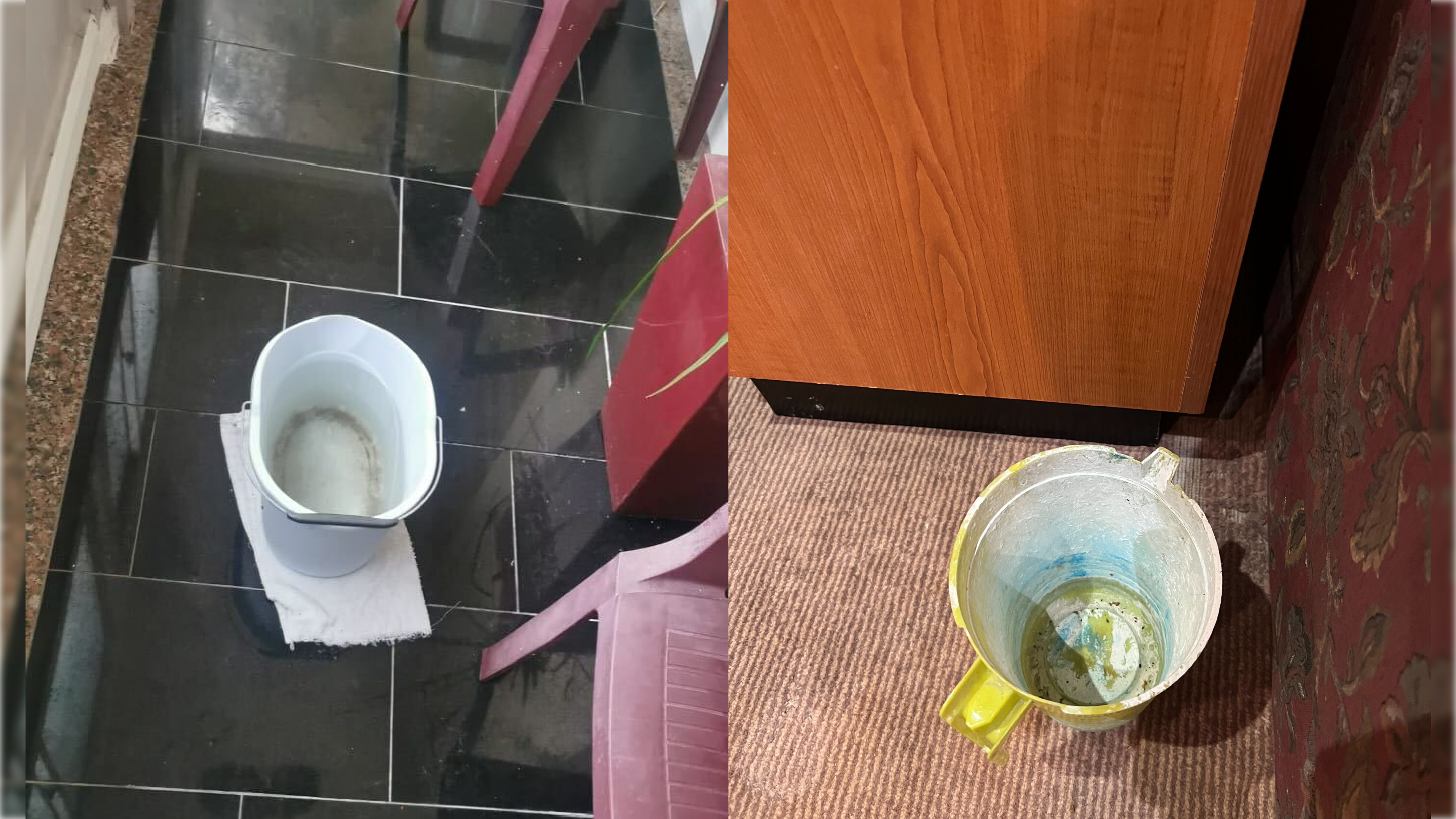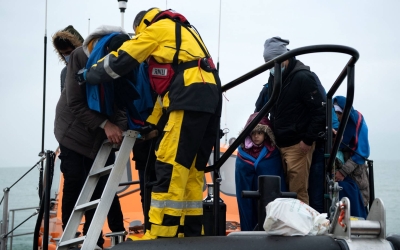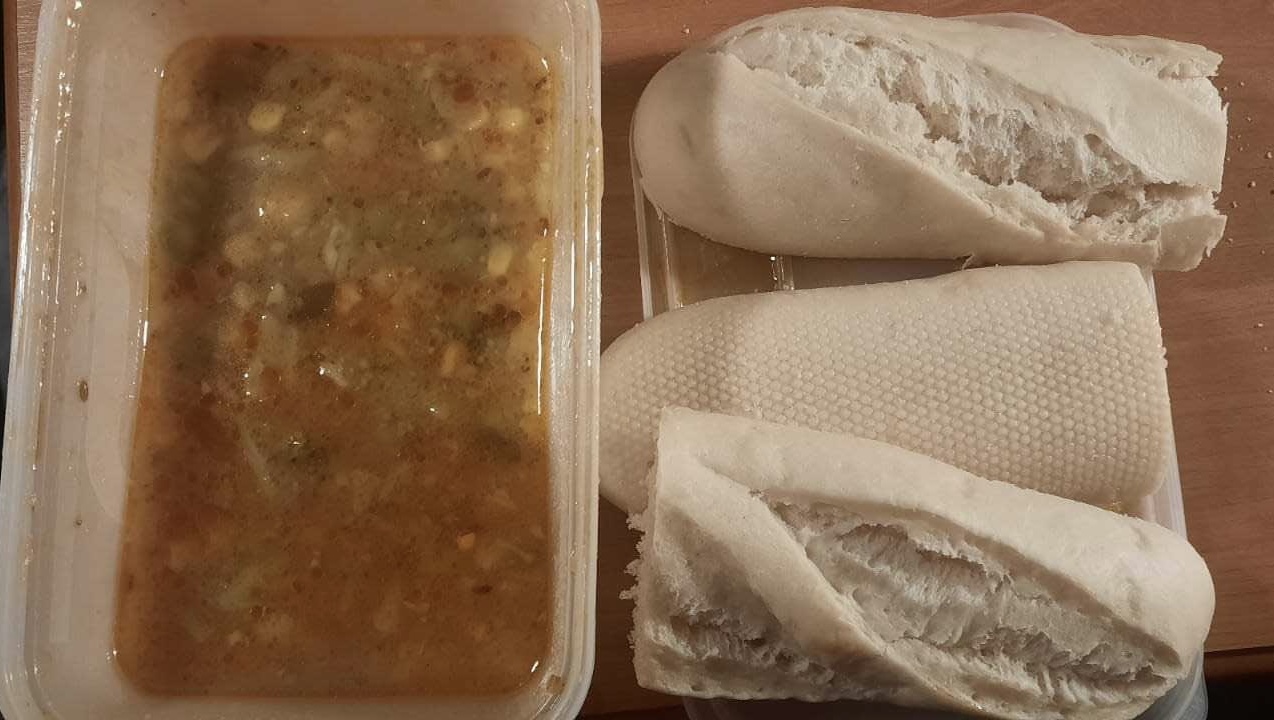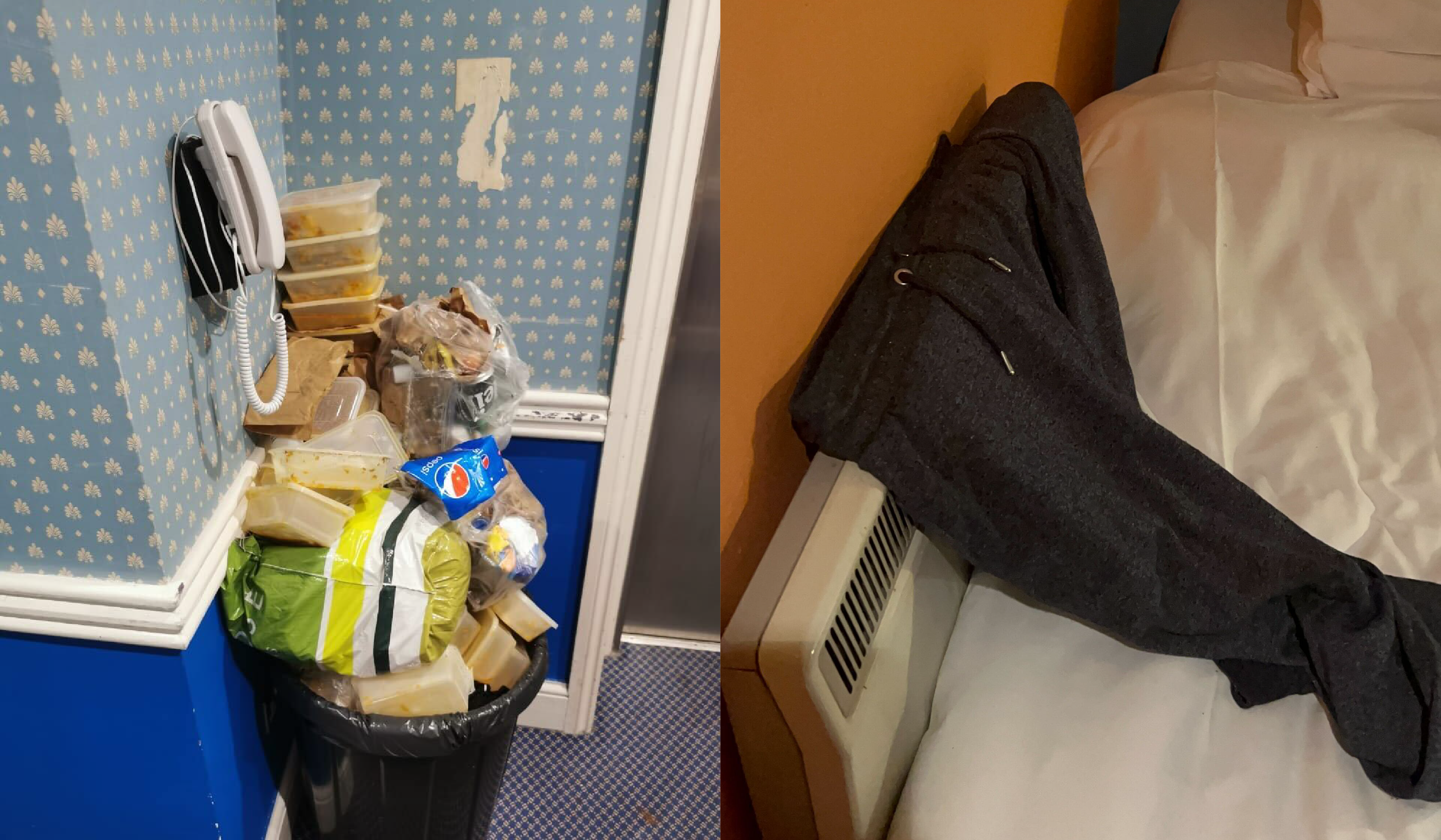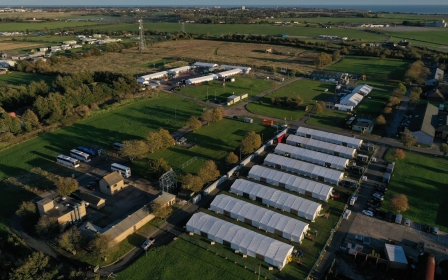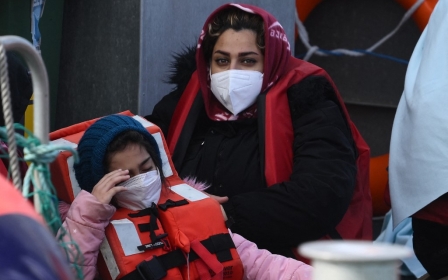UK asylum seekers placed in mouldy, leaking hotel after Manston detention centre
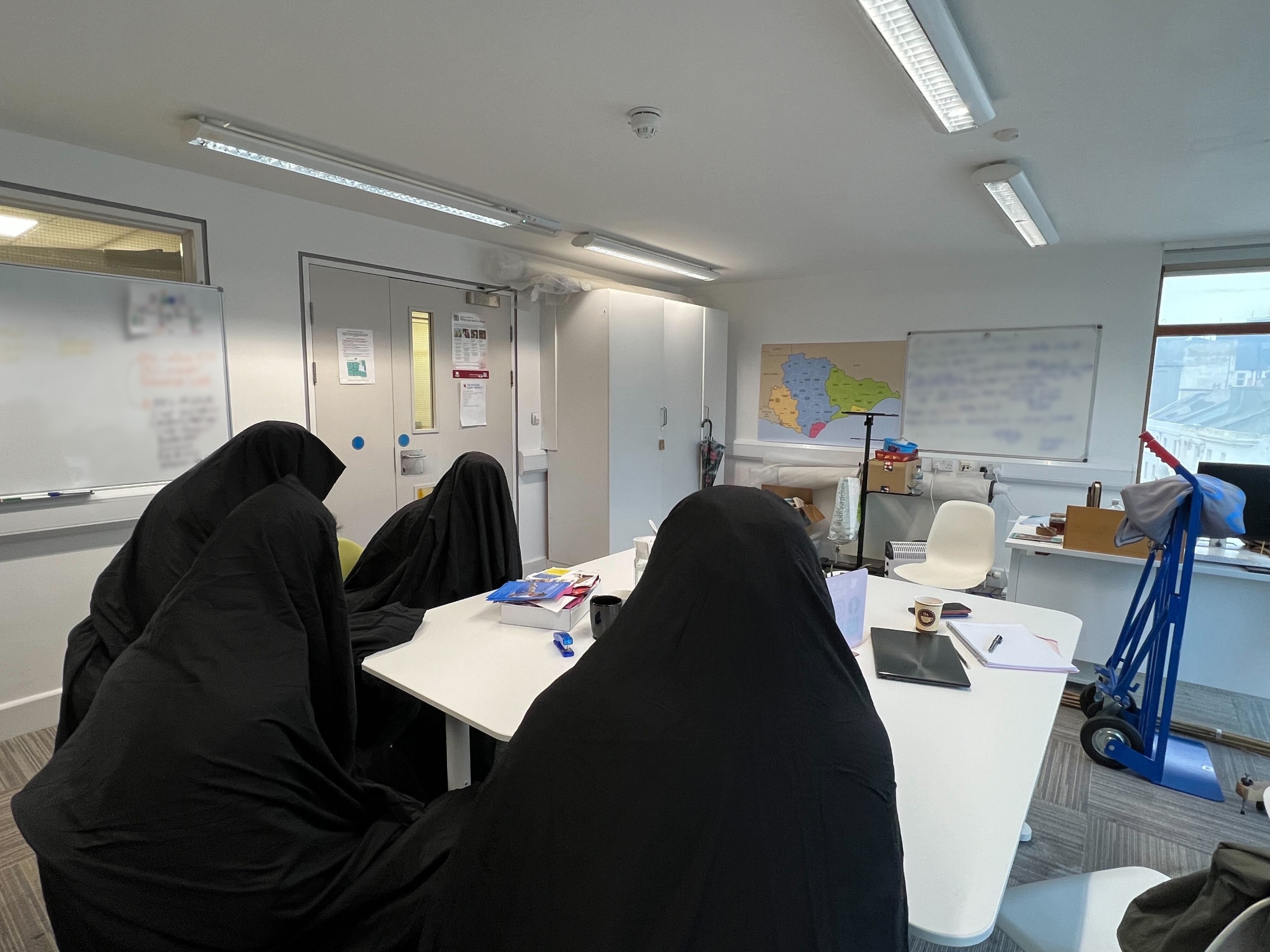
People seeking asylum in the UK who were previously held at a notorious detention centre say they are now being denied basic facilities and forced to live in cramped rooms in a seaside hotel with mouldy, leaking bathrooms.
Dozens of men from countries including Afghanistan, Egypt, Iran, Sudan and Syria are being housed at the Chatsworth Hotel in Hastings on the English south coast.
Some of them told Middle East Eye they had been moved to the hotel from the Manston asylum centre in Kent, where they were detained after crossing the Channel from France on small boats.
Manston was emptied last week over concerns of overcrowding, squalid conditions and a reported outbreak of diphtheria.
The men who spoke to MEE, whose names have been changed to protect their identities, said they had travelled to the UK in search of refugee status and a better life, after fleeing war, instability or repression in their home countries.
New MEE newsletter: Jerusalem Dispatch
Sign up to get the latest insights and analysis on Israel-Palestine, alongside Turkey Unpacked and other MEE newsletters
'We deserve dignity. How long will this hell be? If I stay here for another month, I think I will run away'
- Ibrahim, asylum seeker
"Before coming to the UK, our biggest worry was getting to Britain. [But when] we arrived and were taken to Manston, our next biggest worry was leaving Manston. It was horrible,” said Mohamed, who was placed in Manston and three other hotels before coming to Chatsworth Hotel.
"Since then, we have been taken from place to place and not told where we are, and it's only gotten worse."
It remains unclear how long the Chatsworth Hotel has been used to house asylum seekers, though some of those who spoke to MEE said they had been living there for months. The hotel’s website says it is currently not possible to make reservations.
MEE understands that the hotel was booked on behalf of the Home Office by Clearsprings Ready Homes, a private contractor which manages accommodation for asylum seekers.
MEE contacted Chatsworth Hotel for comment, but had not received a response at the time of publication. Clearsprings Ready Homes referred MEE to the Home Office and said it would not be making a comment. The Home Office told MEE that it would investigate conditions at the hotel.
The issues raised by those staying at the Chatsworth, and seen by MEE during a visit to the hotel, include mould growing in bathrooms, dirty water leaking through the roof and internal ceilings inside their rooms, and cramped conditions. Some windows did not close properly, allowing cold winds from the sea into the rooms.
Residents said that when complaining to hotel staff or requesting basic items that they should speak to the Home Office.
"When we ask for toiletries, laundry services or other basic facilities, the staff always say that we are not allowed and have to speak with the Home Office directly," said Ahmed, who is in his 20s.
MEE saw multiple buckets in the hotel's communal areas and lobbies, intended to stop water that was leaking from the ceiling from staining the carpets.
"We go to the lobby, where the internet is OK, but the problem is that there's water pouring out of the ceiling into a bucket right here, and we sit on the sofa right next to it like it’s normal," said Ahmed.
"And the lobby has five or six sofas that can seat a maximum of about 12 to 13 people, when there are about 70 people in the hotel. So when you go downstairs, and the sofas are occupied, you have to sit on the carpet, which is smelly and dirty."
Salim, a refugee in his 20s, said that paint from the bathroom often crumbled onto his body when he was taking a shower, which he said had caused him skin irritation and respiratory issues.
"The bathroom is crumbling old paint and sticking to our skin whenever we shower," he said.
Many refugees described people constantly coughing and developing skin conditions after leaving Manston, and other facilities used to accommodate asylum seekers.
MEE witnessed some people coughing in their rooms and in communal areas.
Others said their bathrooms had not been cleaned for several weeks, and described how security had increased at the hotel in the past week to deter journalists and outsiders from visiting.
Many complained of going hungry and of not receiving regular food. They said they had been given uncooked baguettes and stale bread to eat. Some said they tried to warm the bread on heaters in their rooms.
Some who spoke to MEE said the food was too spicy, and they were unable to hold it in their stomachs after developing stomach problems while at Manston.
Others said they were unable to eat the food because of health conditions and relied instead on the help of charities and people at a local mosque.
"When we first came here, we had no one to help us from the government or hotel… to tell us things like where the mosque was, or how we wash our clothes," said Yakub, a Syrian man who said he had been living at the hotel for several months.
"It was only when I bumped into someone from the same country who realised I was a refugee. They took us to the mosque, who welcomed us with open arms, gave us food from our country, and helped others in the hotel.
"People in Hastings have been kind to us and helped us more than the hotel and Home Office."
Some complained that the hotel had not provided them with adequate drinking water and had told them to drink from the bathroom tap.
"Not even a dog would want to drink from the sink," said Yusuf, who was previously in Manston before coming to Chatsworth.
"And even if the water is drinkable, why would you want to drink water from the same place where you wash your clothes and hands after using the toilet?"
Rossana Leal, who heads the Refugee Buddy Project, a charity helping asylum seekers in Hastings, said many of the men now housed at the hotel had arrived with nothing except the clothes they were wearing.
"When the refugees reach detention centres like Manston, their bags and any belongings are confiscated," said Leal.
"That's why most men in Chatsworth have no phones, extra clothes to wear, or toiletries like shampoo or toothbrushes."
Leal said the Home Office did not notify local authorities or her charity that the hotel was being used to house asylum seekers. They only discovered the situation when some of the men reached out to the charity in early November.
"Our individual needs assessments established that all the men needed warm clothes, including shoes, as many of them are still wearing flip flops," Leal told MEE.
Since then, the charity has given the men spare clothes, toiletries and support with their asylum applications. But the charity, which relies on donations and part-time staff, has been stretched by demand.
Until the charity intervened, those who spoke to MEE said they had not been provided with a toothbrush or other basic washing items for two weeks, and had to “scrape plaque from their teeth using their fingers and nails”.
They said the hotel had not provided them with access to a washing machine.
Most had resorted to washing their underwear in their bathroom sinks, cleaning their clothes with shampoo and drying them on the heaters in their rooms.
Yakub told MEE he had worn the same set of clothes for two weeks, washing his underwear to stay clean as he waits to hear back from the Home Office.
Others said they relied on the kindness of individuals they had met in the local area, who let them use their washing machines and donated clothes to them.
They said they had received no help from the Home Office with filing their asylum applications, nor been provided with any guidance about services available to them.
Their only sources of information, they said, were a copy of a Home Office guide in Pashto left in the hotel lobby and their own research on the internet.
Even this had been challenging: residents complained of poor mobile phone coverage in the building and said they had not been provided wifi access.
Some of the men who spoke to MEE said they had been waiting for months to be updated by the Home Office on the progress of their asylum cases.
Others said they had been moved three or four times between hotels and detention facilities. None had any idea how long they would remain at the hotel.
"I have no money, identification or news from the [British] government on what will happen to us. We all risked our lives for a better life, but instead we're stuck here," said Ibrahim.
"We deserve dignity. How long will this hell be? If I stay here for another month, I think I will run away."
A Home Office spokesperson told MEE: “Asylum seekers are provided safe, secure accommodation funded by the UK taxpayer while we consider their claim for international protection.
“We expect high standards from all our providers and will look into this specific case.”
Middle East Eye delivers independent and unrivalled coverage and analysis of the Middle East, North Africa and beyond. To learn more about republishing this content and the associated fees, please fill out this form. More about MEE can be found here.


